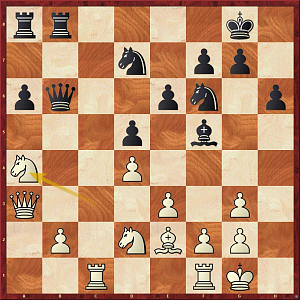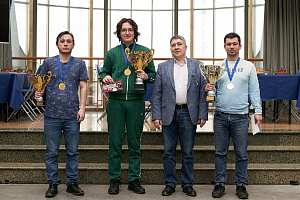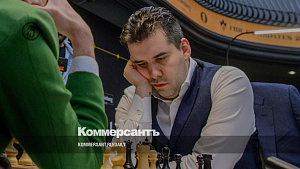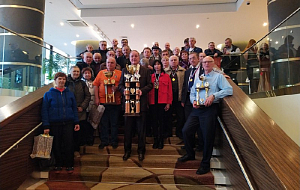Take a Revenge and Do Not Worry
Dmitry Kryakvin’s followup report on the Russian Cup finals
The chess festival in Khanty-Mansiysk is gradually coming to an end. It is hard to imagine how exhausted the arbiters and organizers are with a bunch of high-organized tournaments lived through and not having an easy time before as well. Meanwhile, fatigue is slowly catching up with the participants also since a knockout takes a lot of energy preparing for the game and toiling over the board, as well as reassuring your friends and relatives about not having blundered in the opening but actually having the right idea in mind when heading for the game.
Nevertheless, fatigue is not about everyone. Within reach of a coveted trophy, Marina Guseva was the one dictating the course of the final match against Polina Shuvalova. Guseva started off by converting a minor edge from a major-piece ending and following it up with pressing the next day notwithstanding the higher points cushion.
Shuvalova – Guseva
Final, game two

I was confident to see Marina's trademark Caro-Kann in the decisive game, but these expectations never materialized as it was the Najdorf instead. The diagram gives Black a bunch of continuations to choose from (keeping also in mind that White is not content with a draw), and Guseva chooses the most principled one.
38...Rxb2! 39.Bxb2 Rxb2 40.Re1 Rb3 41.Bxh3 Rxf3
Black is better off starting with taking the a3-pawn, but there is no sense criticizing Marina as the edge is still with Black.
42.Bf1 Rxa3 43.Rb1
Here Polina put up with the inevitable and offered a draw that was immediately accepted. As a result, Shuvalova has put down another successful entry to her tournament achievements record (and I am sure this is not the last word of the young Muscovite in the Russian Cup finals), and Guseva has finally taken the Cup that she has been striving at for more than one season already - our congratulations to her! Now let's move on to the men's semi-finals.
Dmitry Kokarev and Kirill Alekseenko already met in the Cup finals a year ago, grandmaster from Penza taking the upper hand back then. Game one of this year’s semifinal match was also stacking up in Kokarev’s favor, but stepping in into the matters was his majesty time trouble.
Alekseenko – Kokarev
Semi-final, game one

Alekseenko’s treatment of the opening was aggressive, but Kokarev kept his head cool and fended off all threats calmly. Black is now up two pawns; besides, his a4-pawn is potentially dangerous. Therefore, Alekseenko decided not to await any mercy and went all-in.
36.Bxg6+ Nxg6 37.Nd8+ Kf6 38.Qf2+ Nf4
Keeping an extra pieces was 38...Ke7 39.Qf7+ Kxd8 40.Qxg6, and here Black should not rush to capture on e3 as allowing a perpet after Qxd6. Instead, Black should opt for a calm 40…Bf8 to bereave White of any sensible followup checks, while the knight can always be defended via a check along the h-file. However, time trouble has laws and principles of its own, and the move does not change the evaluation yet.
39.Bxf4 exf4 40.Qxf4+ Ke7 41.Nc6+ Ke8 42.Qg4 Bf6
There is no retaining an extra piece, but once Black eliminates the b2-pawn (as well as trading queens in an ideal scenario), White’s laying down his weapons will not be before time.
43.Qg6+ Kf8 44.Qxh7

44…Qxb2?
This is not the right piece to take the pawn...The queen is needed in the defensive to secure the king from an array of possible checks: 44...Qd1+ 45.Kg2 Qe2+ 46.Kg3 Qe3+ 47.Kh2 Qf4+ 48.Kg2 Qg5+ 49.Kf3, and now it is time for 49…Bxb2, with excellent winning chances. Now, the queen and knight tandem does the trick of saving the game for White.
45.Qh6+ Kf7 46.Qh7+ Kf8 47.Qh6+ Kf7 48.Qh7+ Draw.
Of course, Dmitry could step with his king down the f-file, or test the native of St. Petersburg’s precise play in the line 48…Bg7 49.Nd8+ Ke7 50.Ne6 Qc1+ 51.Kg2 Qh6 52.Qxg7+ Qxg7+ 53.Nxg7 Kf6 54.c5! dxc5 55.d6 a3 56.d7 Ke7 57.Ne6 Kxd7 58.Nxc5+ Kc6 59.Nb3 that ends with a draw; instead, he decided to save firepower for the next game. And for good reason - in game two last year’s Cup finalist also had everything going his way up to a certain moment.
Kokarev – Alekseenko
Semi-final, game two

It is now Kokarev's time to display the power of the knight and queen tandem - subtle maneuvering 36.Ne7 Re6 37.Nd5 Rg6 38.Qf3 Nb7 39.Ne7 Rf6 40.Qg4 Nd8 41.Qc8 Qd3 42.Nd5 Rf8 43.f3 results in an overwhelming position with White having defended all pieces and tied down the opponent’s. As opposed to it, Dmitry hurried to cash in with 36.Qc5?,giving Kirill a second chance to dodge the bullet. 36...Nb3 37.Qxc4 Nd2 38.Qe2 Qxe4 39.Qxe4 Nxe4 40.Re1 Nd2 41.Re2 Nc4 42.Ne3 Nxe3 with a draw.
The second semi-final also failed to reveal the winner in the main time, however, it developed to a completely different scenario. In the first game, Aleksey Sorokin and David Paravyan were playing with Carlsen vs Karjakin world championship game one in mind, then David sidestepped, but apparently not very successfully - Aleksey achieved the “knight vs bishop” opposition, typical for this opening, and in a very good version at that. However, he then failed to cope with the "semi-final tension".
Sorokin – Paravyan
Semi-final, game one

With no special counterplay visible for Black, improving king's position 24.Kf1 a3 seems the most reasonable plan to bring the king even further into the center or initiate some dynamic activities. 25.Rd6 Rac8 26.c5, boxing Black's pieces once and for all. Sorokin decides to attack the pawn without any preliminaries, but overlooks Black's witty rejoinder.
24.Rd6?! Be5 25.Rxc6?? (It is not yet late to go back with 25.Rd3) 25…Rab8!
A paradoxical position! A couple of moves ago, the d7-knight did not give black pieces air to breeze, and now, despite both the e5-bishop and the b8-rook being en prise, White is helpless and remains down a piece as he is let down by home-rank issues.
26.Rxb8 Bxb8 27.g4 Rxd7 28.gxf5 exf5 with an easy conversion.
Having suffered a first defeat in classical chess at this Cup final, not only did the young native of Barnaul not give up, but came back in the second game as Black! However, it was not without Paravyan’s contribution as David treated the opening in a creative manner, and then, having equalized, committed several fatal errors in the endgame.
Paravyan – Sorokin
Semi-final, game two

52.Rb7+?
Prior to dealing with the opponent's passer it is worth not neglecting your own: 52.f6 Ra5+ 53.Ke4 g2 54.Rg8 Ke6 55.Rxg2 Kxf6 56.Kd4 with an easy draw.
52...Kc6 53.Rg7 Ra3?
Passing up on a nice winning opportunity: 53...b3! 54.Rxg3 Ra5+ 55.Ke6 b2 56.Rb3 Rb5, and despite being in close proximity to the queening square, Black is in time to stop the opponent's passer. The text leads to a drawn position again.
54.f6 Rf3 55.f7 g2

56.Rxg2??
Playing in the Cup semifinals is a hard job indeed! A trivial 56.Ke6 would have freed David Paravyan of having to play two more games, whereas the text gives rise to a textbook ending with a king cutoff from the defensive.
56...Rxf7 57.Kd4 Kb5 58.Kd3 Rc7
A couple of moves later Paravyan resigned, deciding against testing Sorokin’s basic knowledge of rook endings.
Despite a bitter defeat, David showed up in good mood for the tiebreak games and carried out a confident offensive against the opponent’s king.
Paravyan – Sorokin
Semi-final, rapid game one

White is up an exchange, but it is far from over yet. After 20...cxd4 21.cxd4 Qe8 Black covers intrusion squares and wants to transfer the bishop to b6 with enough counterplay; however, Sorokin’s followup regrouping is not to the point 20...Qc7 21.Qg6 Kd7, running into 22.c4!, and David ended up getting at the opponent’s king before long. David never gave his opponent a second chance, qualifying into the final without any Armageddons. We wish Paravyan success in the final match, and we also congratulate Aleksey Sorokin on excellent performance in the Cup - only a few have ever reached the semifinal stage from the first attempt.
In the second semifinal a misfortune was in store for Dmitry Kokarev. At first, Dmitry was forced to sacrifice a piece, but could not get any special dividends from it, whereas in the next game there happened a blunder quite natural for the semi-final stage.
Alekseenko – Kokarev
Semi-final, rapid game two

Looking back at game one, Black should be content with the outcome of the opening since the board is full of material and no forced draws in view. 14...Nc5 and a flexible 14...e6 are possible among many other options available to Black, but Kokarev decides to trade queens, overlooking a standard blow typical for this pawn structure.
14...Qc4? 15.Qxc4 Rxc4 16.e5! Bxg2 17.exf6 Bxf1 18.fxg7 Re8 19.Kxf1 Kxg7 20.a5 b5 21.Nd5 – there is no winning a position like this, and soon Kokarev offered a draw, that was equal to congratulating his opponent on qualifying into the final. Notwithstanding the result, it is impossible not to admire Dmitry Kokarev's stable performance as the Penza grandmaster has been steadily taking medals in the Cup for several years in a row now, while many a player fail as soon as the starting round.
Alekseenko took a revenge for the last year's Cup, and Paravyan did the same for a missed first place in the U20 Russian championship of the last year as well. End of the year is the best time to pay back your debts, which Kirill and David are only well aware of. Not knowing about any such “debts” between the current finalists, so we are just looking forward to a fascinating finale. Moscow vs St. Petersburg is never disappointing!





















